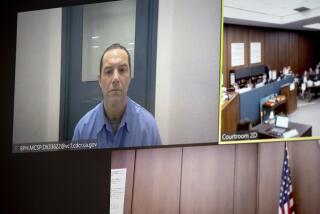S.D. woman’s murder conviction thrown out after DA abruptly drops opposition to new trial bid
- Share via
SAN DIEGO — A San Diego County Superior Court judge Friday wiped out the two-decade-old murder conviction of former Valley Center executive Jane Dorotik after prosecutors conceded new DNA evidence cast enough doubt on a conviction, one they had zealously guarded, to warrant a new trial.
The decision by Superior Court Judge Harry Elias is not a clear exoneration of Dorotik, who has insisted she did not kill her husband, Robert, in February 2000. She could still face another trial, a possibility that will be discussed at a hearing set for Oct. 23.
Steve Walker, director of communications for San Diego County Dist. Atty. Summer Stephan, said prosecutors want to conduct DNA testing, and retesting, on evidence in the case. The outcome of those tests will probably weigh into a final decision on a new trial.
A team of lawyers from the Loyola Law School Project for the Innocent, who have worked on Dorotik’s case for years, argued in a detailed court filing that DNA testing using new techniques shows that her DNA was not on crucial evidence in the case: her husband’s clothing, DNA from a rope he was strangled with and scrapings from beneath his fingernails.
That DNA technique was not available in 2001, Walker said.
“Ultimately, this office intends to pursue DNA testing and retesting of the available evidence in this case using modern and advanced DNA technology available to us today,” he said. “Whatever the outcome of this additional testing may be, this office will commit resources to this matter in an effort to do all we can to seek the truth and pursue justice.”
Paula Mitchell, legal director for the law school’s innocence project, said that they were ecstatic at the ruling, and that it was a surprise that the district attorney’s office decided to drop opposition to Dorotik’s bid for a new trial. A hearing on that issue was scheduled for next week, but Mitchell said prosecutors gave no indication ahead of the hearing Friday that they were going to concede.
“It is pretty telling,” said Mitchell, who has derided the poor forensic and police work that led to her client’s incarceration. “They did not want the evidence we were going to present next week to be out in the public.”
In comments released through the Project for the Innocent, Dorotik said she was grateful for the ruling and insisted as she has for two decades she had nothing to do with her husband’s death.
“Frankly, I’m a little overwhelmed at the moment,” she said. “I have maintained from day one that I had nothing to do with my husband’s murder. Spending almost two decades in prison falsely convicted of killing the man I loved has been incredibly painful.”
Dorotik, 73, has been out of state prison since April, when her lawyers successfully argued that she should be released from the California Institution for Women in Chino because she was at great risk of contracting COVID-19 due to her age and underlying health conditions.
At that time, prosecutors opposed her release, citing the serious nature of the crime and the fact her conviction had been upheld by appeals courts multiple times. Dorotik has been staying with a sister in Los Angeles County.
This is the latest turn in a case that began when Dorotik reported her husband was missing on the evening of Feb. 13, 2000. She said the last time she saw him was earlier that day as he prepared to go running. She was arrested two days later.
At the time Jane Dorotik was a successful high-level executive for a mental health services company who also raised and trained horses at the family’s Valley Center ranch.
The evidence against her at trial included blood found in the master bedroom and a syringe that prosecutors argued had Jane Dorotik’s fingerprint on it along with a smudge of her husband’s blood.
But Project for the Innocent lawyers toiled on her case and in 2015 won a court ruling allowing DNA testing on the rope and fingernail scrapings, neither of which had been tested before. The new tests excluded Dorotik as a possible contributor.
The lawyers also argued she was a victim of bad forensic evidence analysis and a botched police investigation that overlooked a possible suspect and hid other evidence.
Last October, in a ruling ordering a new hearing on Dorotik’s claims of wrongful conviction, Elias wrote the lawyers had assembled “voluminous evidence to establish that much of the forensic, DNA and blood evidence presented against her at trial was false and that arguments to the jury included extensive false statements regarding the forensic evidence.”
Moran writes for the San Diego Union-Tribune.
More to Read
Sign up for Essential California
The most important California stories and recommendations in your inbox every morning.
You may occasionally receive promotional content from the Los Angeles Times.














